
Bernard John Taupin is an English lyricist and visual artist. He is best known for his songwriting partnership with Elton John, recognised as one of the most successful partnerships of its kind in history. Taupin co-wrote the majority of John's songs, dating back to the 1960s.

Elton John is the second studio album by English singer-songwriter Elton John. It was released on 10 April 1970 through DJM Records. Including John's breakthrough single "Your Song", the album helped establish his career during the rise of the singer-songwriter era of popular music.
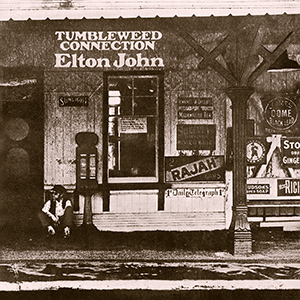
Tumbleweed Connection is the third studio album by English singer-songwriter Elton John. It was recorded at Trident Studios, London, in March 1970, and released in October 1970 in the UK and January 1971 in the US. It is a concept album based on country and western and Americana themes. All songs are written by John and Bernie Taupin, with the exception of "Love Song" by Lesley Duncan.
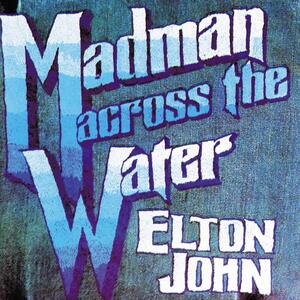
Madman Across the Water is the fourth studio album by English musician Elton John, released on 5 November 1971 by DJM and Uni Records. The album was his third album to be released in 1971, at which point John had been rising to prominence as a popular music artist. John's first progressive rock album, Madman Across the Water contains nine tracks, each composed and performed by John and with lyrics written by songwriting partner Bernie Taupin. Yes keyboardist Rick Wakeman plays Hammond organ on two songs.
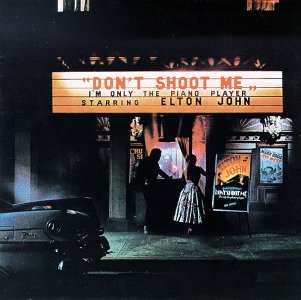
Don't Shoot Me I'm Only the Piano Player is the sixth studio album by English musician Elton John. Released on 26 January 1973 by DJM Records, it was the first of two studio albums he released in 1973, and was his second straight No. 1 album on the US Billboard 200 and first No. 1 album on the UK Albums Chart.

"Tiny Dancer" is a song written by English musician and composer Elton John and lyricist Bernie Taupin, and performed by John. It was originally released on John's 1971 album Madman Across the Water as its opening track, and was later produced and released as a single in 1972.

Too Low for Zero is the seventeenth studio album by English musician Elton John, released in 1983. The album marked a comeback for John, whose previous four albums had failed to yield many enduring international hit singles, and had disappointing sales compared to his string of hit records released during the first half of the 1970s.
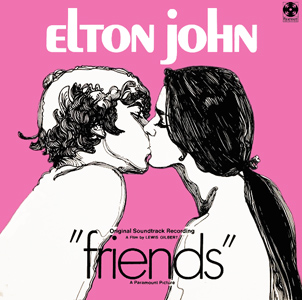
"Friends" Original Soundtrack Recording, released in 1971, is the fourth official album release by Elton John. It was a project John and Bernie Taupin took on before their breakout success in the US, and served as the soundtrack album for the Friends film released in the same year. It was certified Gold in April 1971 by the RIAA. It became John's third gold record in as many months in that market. The title track was a minor hit in the US despite the film's mediocre performance. The album also received a 1972 Grammy nomination for Best Original Score Written for a Motion Picture or Television Special at the 14th Annual Grammy Awards.

"Levon" is a song written by English musician Elton John and songwriter Bernie Taupin, and performed by John. It was recorded on 27 February 1971, and was released on John's 1971 album, Madman Across the Water. Backing vocals are provided by Tony Burrows. Paul Buckmaster wrote the orchestral arrangements and conducted the orchestra.
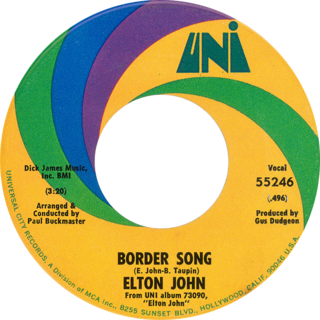
"Border Song" is a song by Elton John with music by John and lyrics by Bernie Taupin. The song initially appeared on the 1970 album Elton John, and was released in the spring of 1970 as the LP's first single. After failing to chart in the UK, it was released in North America a few months later. It met with more success there, especially in Canada, where it peaked at No. 34. The appearance of "Border Song" on the Canadian charts was John's first chart appearance in any country.

The Captain & the Kid is the twenty-eighth studio album by English musician Elton John, released in 2006. It is his second autobiographical album with lyricist Bernie Taupin, picking up where Captain Fantastic and the Brown Dirt Cowboy (1975) left off. The Captain & the Kid chronicles the events in their lives over the intervening three decades.
"Skyline Pigeon" is a ballad composed and performed by English musician Elton John with lyrics by Bernie Taupin. It is the eighth track on his first album, Empty Sky. It was originally released by Guy Darrell and Roger James Cooke simultaneously as a single in August 1968.
Caleb Quaye is an English rock guitarist and studio musician best known for his work in the 1960s and 1970s with Elton John, Mick Jagger, Pete Townshend, Paul McCartney, Hall & Oates and Ralph McTell, and also toured with Shawn Phillips in the 1970s. He is the son of singer/pianist Cab Kaye, younger brother of musician Terri Quaye, and elder half-brother of singer Finley Quaye.
"Crazy Water" is a song by English musician Elton John with lyrics written by Bernie Taupin. It is the seventh track on his 1976 album, Blue Moves. It was released as a single in the UK in February 1977. The single reached No. 27 in the UK singles charts.

"Ego" is a 1978 song performed by English musician Elton John, written by John and Bernie Taupin. It was released in early 1978 as a standalone single, and did not appear on the album released in the same year, A Single Man. John played this song live from 1978 up until 1980. The single reached #34 in both the UK and the US.
"Have Mercy on the Criminal" is a song written by English musician Elton John and songwriter Bernie Taupin, and performed by John. It is the most frequent live-track on the album besides the two dominating singles, "Daniel" and "Crocodile Rock".

Live at Benaroya Hall with the Seattle Symphony is the fourth album by American singer-songwriter Brandi Carlile, released on May 3, 2011, through Columbia Records. Recorded during two sold-out shows in November 2010 at Benaroya Hall in Seattle, Washington, the album features Washington-native Carlile and her long-time band performing alongside the Seattle Symphony. Seattle-based producer and audio engineer Martin Feveyear recorded the concerts, which contained orchestral arrangements by Paul Buckmaster and Sean O'Loughlin. Carlile had previously performed with the Seattle Symphony in 2008 at the same venue.

Passengers is a 1984 song by English musician Elton John that appears on his 1984 album Breaking Hearts, released as the second single of the album. The song reached number five on the UK chart, and reached the top ten in Australia, but was not released as a single in the US.

Revamp: Reimagining the Songs of Elton John & Bernie Taupin and Restoration: Reimagining the Songs of Elton John and Bernie Taupin are two tribute albums to English musician Elton John and his frequent songwriting partner Bernie Taupin, both released on 6 April 2018. Revamp was described as John's project and features covers of the duo's back catalogue by pop, rock and R&B artists, whereas Restoration was seen as Taupin's project and features covers by country music artists. Revamp was released via Island Records and Restoration by Universal Music Group Nashville. The release of the albums coincided with John's 2018–2023 Farewell Yellow Brick Road tour.
"We All Fall in Love Sometimes" is the ninth track on Elton John's album Captain Fantastic and the Brown Dirt Cowboy, written by John (music) and Bernie Taupin (lyrics), and released in 1975.













